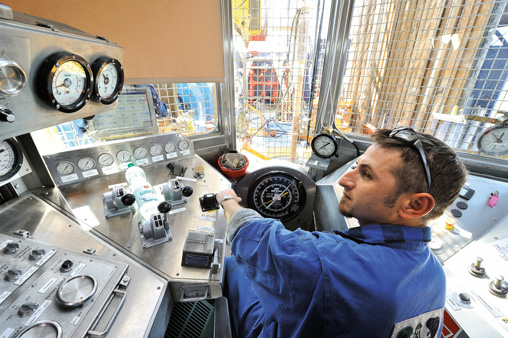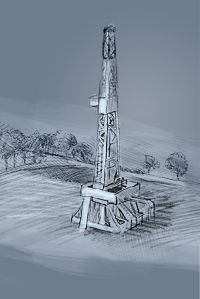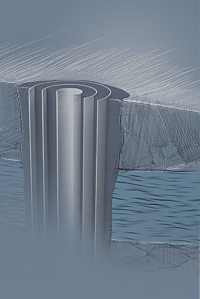Risks
Regulatory Environment
Further changes in the laws governing operation of the gas sector are to be expected in 2012.
First of all, the Gas Law is to be enacted. It will supersede the Energy Law and the Act on Stocks of Crude Oil, Petroleum Products and Natural Gas, as well as on the Rules to be Followed in the Event of Threat to National Fuel Security or Disruptions on the Petroleum Market.
Changes in the legal environment and delays in amending laws and regulations create risks stemming from uncertainty as to the scope of regulatory changes and the short time for adjusting to such changes, which might adversely affect the financial performance and growth prospects of the PGNiG Group.

The amendment of Act on Stocks of Crude Oil, Petroleum Products and Natural Gas, as well as on the Rules to be Followed in the Event of Threat to National Fuel Security or Disruptions on the Petroleum Market has limited the number of entities required to keep mandatory stocks to energy companies importing natural gas for resale. Additionally, the amended act allows for exemption from the obligation to keep mandatory stocks (upon fulfilment of certain conditions defined in the act) and permits maintaining mandatory stocks within the territory of another EFTA member state. This change may help PGNiG’s competitors reduce their operating costs, and thus have a negative effect on our competitive position.
The Energy Efficiency Act came into force in August 2011. The Act implements Directive 2006/32/EC of the European Parliament and of the Council of April 5th 2006 on energy end-use efficiency and energy services. The Energy Efficiency Act establishes a national target for economical energy use, whereby savings of end-use energy until 2016 should be no less than 9% of the annual national consumption of energy. In line with the new act, PGNiG, as a trading company, is required to purchase energy efficiency certificates or else to pay non-compliance penalty. This will drive up the cost of regulated activities and, consequently, inflate gas prices paid by customers.
Tariff Calculation
PGNiG’s ability to cover costs of its core operations depends on tariff prices approved by the President of URE. While approving tariffs for a given period, the President of URE considers other external factors, which are beyond PGNiG’s control. In an attempt to protect disadvantaged customers, in his review of operating expenses the President of URE may consider certain cost unjustified. Moreover, the President of URE does not always accept the assumptions adopted by PGNiG with respect to main drivers of cost changes and profit targets allowing for business risk. As a consequence, the URE may also refuse to approve tariff prices and charges applied for by PGNiG. Lower tariff prices and charges might adversely affect our profitability.
Purchase Price of Imported Gas
Prices of imported gas are denominated in the US dollars or the euro and are based on prices of petroleum products. Changes in foreign exchange rates and prices of petroleum products materially affect cost of imported gas. Even an accurate forecast of natural gas prices may be subject to material errors. There is a risk that despite the legal possibility of adjusting prices approved for a tariff term, an increase in the price of imported gas may not be fully passed onto customers or the changes in selling prices may lag behind the changes in import prices.
Resource Discoveries and Estimates
The main risk inherent in exploration is the risk of failure to discover reserves, i.e. the exploration risk. This means that not all the identified potential deposit sites have deposits of hydrocarbons, which can qualify as an accumulation. Whether or not a sufficient accumulation exists depends on a number of geological factors. Furthermore, the actual quantity and quality of the accumulated hydrocarbons may differ from estimates. When the results of successful exploration activity, in the form of new reserves, do not offset the production from the existing reserves, PGNiG’s recoverable reserves will decrease pro rata to the current production volumes.
The risk associated with exploration for unconventional gas in Poland relates to the lack of confirmed presence of shale gas and tight gas. Even if existence of in-place petroleum is confirmed, its production may prove uneconomic due to insufficient gas recovery and high investment expenditure necessary to be incurred on drillings and construction of the production infrastructure. Another material factor is connected with difficult access to unconventional gas plays given the environmental regulations and the need to obtain landowners’ consent for access to the area.
Competition in Exploration
Both on the Polish market and abroad there is a risk of competition from other companies seeking licences for exploration for and appraisal of hydrocarbon deposits. Certain competitors of the PGNiG Group, especially global majors, enjoy strong market positions and have financial resources larger than those of PGNiG. Thus they are likely to bid for and be able to acquire highly prospective licences.
Delayed Work
Under the applicable Polish regulations, obtaining oil and gas exploration and prospecting licences takes from one to one and a half years. On foreign markets, it may take even two years from the time that the winning bid is awarded in a licensing process until the relevant contract is ratified. Moreover, prior to the commencement of field work, the successful bidder is required to arrange for numerous formalities, including obtaining formal and legal permits and approvals for entering the area, meeting environment-related requirements and in some cases requirements related to protection of archaeological sites, and abiding by the regulations governing tenders for work contractors, which may cause another several months to pass before an agreement with the work contractor is signed. In addition, companies must frequently wait for a very long time before their imported equipment receives customs clearance. These factors create the risk of delayed exploratory work.
Cost of Exploratory Work
Exploratory work is capital intensive, given the prices of energy carriers and materials. Cost of exploratory work is especially sensitive to steel prices, which are passed on prices of casing pipes and lifting casing used in drilling. An increase in prices of energy and materials translates into an increase in the cost of exploratory work. Moreover, profitability of foreign exploration projects to a significant extent depends on the prices of oil derivative products and on exchange rates. In 2011, PGNiG introduced the Daily Rate system into the drilling contractors selection procedure, which is expected to reduce the costs of drilling services.
Political and Economic Situation
Some countries where PGNiG conducts exploratory activities face the risk of armed conflicts or social and political unrest, which may result in limitation, suspension or discontinuation of the exploration and production business in such areas. In certain countries, the operations of exploration companies may be hindered by lack of adequate infrastructure, which may be an obstacle in transporting equipment, staff and materials to the sites. Problems may also arise in providing supplies and ensuring appropriate health care. These risks may lead to limitation or suspension of the Company’s exploratory activity.
Trade in Natural Gas
PGNiG is the largest supplier of natural gas in Poland. Our share in the gas market is approximately 98%, the remaining 2% is represented by suppliers from outside the PGNiG Group, which usually purchase gas from us. However, in 2012–2013, important changes are expected to take place in the natural gas market and its legal environment. Deregulation of gas prices for institutional customers is planned to take effect as of January 1st 2013, followed by deregulation of gas prices for households (in two-three years’ time). Additionally, the Gas Law and the new Energy Law are to be enacted in 2012. As a result of these changes, our share in the natural gas market may significantly fall, with the existing or new gas traders being the main beneficiaries. On the other hand, following the deregulation process, gas prices will be chiefly market-driven.
Increase in the Volume of Mandatory Stocks
Pursuant to the Act on Mandatory Stocks, as of October 1st 2012, the volume of mandatory stocks must be increased from 20 to 30 days of average annual imports. As a result, there is a risk that we will not be able to meet our obligations under the gas sales agreements, given that significant storage capacities which will have to be used for storage of the increased mandatory stocks.
Distribution
The liberalisation of the gas market helps gas suppliers who are the competitors of our Gas Distribution Companies. Gas distributors progressively expand their networks and attract new customers. Additionally, new players have emerged which offer LNG distribution services. The market entry barriers are significantly lower in this segment, as LNG distribution involves much lower capital expenditure and does not require a connection to the gas system or adequate reserve capacity to be maintained in the transmission and distribution networks. Another issue which affects the Distribution Companies’ competitive position is the tariff policy of the Energy Regulatory Office, which prevents the Distribution Companies from operating a flexible pricing policy for their key customers. With the lack of flexible pricing, customers may find the offering of the competition very attractive.
Power Generation Projects
Our involvement in power generation projects will to a large extent depend on the prices of CO2 emission allowances, which, if they fall, will result in low profitability of electricity generation in gas-fired cogeneration systems. Higher crude oil prices on the global markets, resulting in increased prices of natural gas, will contribute to lower competitiveness of gas fuel relative to power coal. Moreover, another factor contributing to the uncertainty as to the profitability of power projects is the fact that the government administration has not clearly stated whether it would continue to maintain its “yellow certificates” support system for gas-fired cogeneration beyond 2012.




